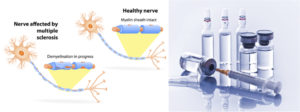In the current issue of JNNP, Lizak and colleagues have published an interesting epidemiological study based on global multiple sclerosis (MS) database (MSBase), to evaluate prognostic factors in moderately advanced and advanced MS, specifically the impact of highly active immunomodulatory therapy. Using prospectively collected data from over 4000 patients with MS, the cohort was divided into three epochs between EDSS steps 3-6, 4-6 and 6-6.5 respectively. A multivariate survival model was used to examine the role of immunomodulatory therapy and clinical/demographic variables on progression to the outcome EDSS step 6/6.5. In summary, the disability trajectories showed large variability. The probability to reach the outcome was not associated with baseline variables, suggesting that previous disease activity before progress into advanced stages does not have a significant impact on later disease progression. However, higher relapsed rate was associated with disability. Additionally, highly active immunomodulatory therapy was associated with lower risk of reaching the outcome disability step. The authors conclude that disease progression in moderately advanced and advanced MS is highly variable and amnesic to prior disease activity. Lower relapse rates and greater time with active immunomodulatory therapy are associated with decreased risk of accumulating further disability.

In the last decade, we have seen significant advances in our understanding of MS, together with a rapid rate of progress in developing new effective disease modifying drugs. All these advances have reduced the levels of disability in comparison to patients who developed the condition decades ago. Although active immunomodulatory therapy has been proven to prevent relapses and reduce first disability progression, their effect in accumulative disability remains undefined. Moreover, the hypothesis of two possible MS pathophysiological phases, the first one dominated by an autoimmune inflammatory process and the second one driven by neurodegenerative mechanisms, which may be independent of each other, have suggested that the immunomodulatory therapy is not effective in advanced MS stages. However, the results of the study propose that highly active immunomodulatory therapy may delay disability in advanced MS, bringing hope to MS patients in this disease stage. Therefore, further randomized controlled trials are needed to evaluate the efficacy of these treatments during advanced disease stages. In the meantime, MS management needs to focus on optimizing clinical vigilance of progression and consider drug therapy modification in patients with incomplete responses.
Read more at http://jnnp.bmj.com/content/jnnp/88/3/196.full